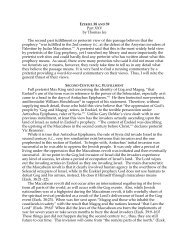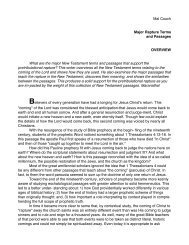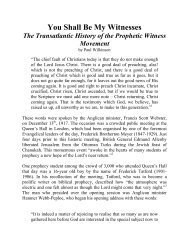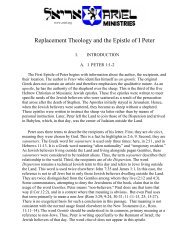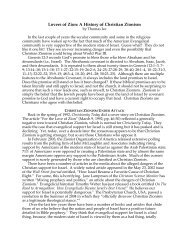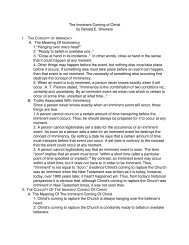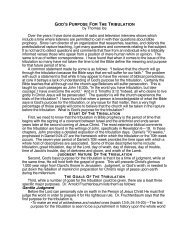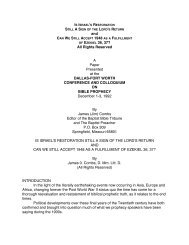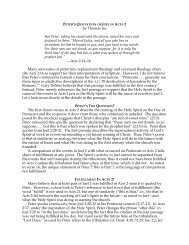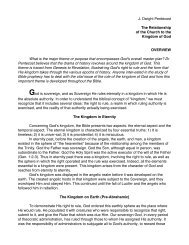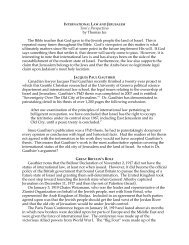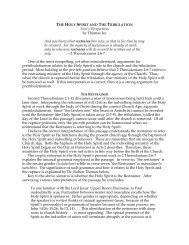AN INTERPRETATION OF MATTHEW 24â25 Part XI by Thomas Ice ...
AN INTERPRETATION OF MATTHEW 24â25 Part XI by Thomas Ice ...
AN INTERPRETATION OF MATTHEW 24â25 Part XI by Thomas Ice ...
Create successful ePaper yourself
Turn your PDF publications into a flip-book with our unique Google optimized e-Paper software.
The result of lawless increasing will be that “most people’s love will grow cold.” There is<br />
a cause effect relationship in this passage. The phrase “most people” is literally “the many.”<br />
Morris tells us that in this context, “’the many,’ indicates the majority; . . . ‘most of you.’” 6 This<br />
is one of the reasons I think it is speaking of the unbelieving world, as opposed to<br />
believers. The rest of Scripture does not support the notion that most believers will be<br />
characterized <strong>by</strong> apostasy during the tribulation, instead, this is the state in which the world in<br />
general is characterized. “This seems more related to the general condition of the world,”<br />
says Ed Glasscock, “than to the followers of Jesus.” 7<br />
What does Jesus mean when he says, “love will grow cold.” The expression itself is<br />
clear: loss of love. The main significance is to see the cause/effect relationship between<br />
lawlessness and loss of love. Morris explains it well:<br />
But real love is impossible for the lawless person. By definition the lawless<br />
person is motivated <strong>by</strong> personal, selfish concerns, not <strong>by</strong> any regard for others<br />
or for the rules that govern our intercourse with one another. So with the upsurge<br />
of lawlessness there is a cooling off of love. The one necessarily involves the<br />
other. 8<br />
It is in just such an environment that will facilitate the man of lawlessness of 2<br />
Thessalonians 2 to set up his image in God’s rebuilt Temple in Jerusalem. And, it is to just<br />
such an act that Jesus’ current discourse is moving (24:15).<br />
END-TIME ENDUR<strong>AN</strong>CE<br />
The exact meaning and implications of “the one who endures to the end, he shall be<br />
saved,” is a hotly debated passage. Some use this passage to teach a Christian doctrine<br />
known as the perseverance of the saints.” While others believe that it refers to a physical<br />
deliverance. I hold to the latter position, primarily because it is the only view that makes<br />
sense in this specific context.<br />
The first issue that must be dealt with in this matter is the meaning of the term “saved.”<br />
Because the word “saved” is used in the New Testament to refer to the time when one<br />
becomes a Christian (the moment of justification as in), many just plug that meaning into this<br />
passage. The leading Greek lexicon of our days says that the basic meaning of this word is<br />
“save, keep from harm, preserve, rescue.” 9 This word can be used in relation to the<br />
doctrine of salvation (Matt. 1:21; Acts 16:31; 1 Cor. 1:18; Eph. 2:8-9; Phil. 1:19; Titus 3:5,<br />
etc.), or it can simply refer to physical deliverance or rescue (Matt. 8:25; 14:30; 27:49; Acts<br />
27:31; Heb. 5:7; Jude 5, etc.). The exact nuance is determined <strong>by</strong> its context. “The<br />
problem begins with the superficial hermeneutic of giving ‘saved’ the same meaning in<br />
every context, which is not true of any word,” declares Glasscock. “Words have no specific<br />
meaning apart from context. Here, ‘saved’ (sozo) means basically to ‘deliver’ or to<br />
‘rescue’—from what and in what manner is dependent upon the context.” 10<br />
Many commentaries on this passage fail to consider the contextual factors before they<br />
start sermonizing on endurance in the Christian life. They make this into a passage that<br />
teaches the Christian doctrine of endurance, even though it is not supported <strong>by</strong> the specific<br />
factors in the text. 11 Truly, there is a Christian doctrine of endurance taught in the Epistles<br />
(Rom. 12:12; 1 Cor. 13:7; 2 Tim. 2:10, 12; Heb. 12:3, 7; James 1:12; 5:11; 1 Pet. 2:20).<br />
This doctrine teaches that one of the many character qualities that believer is to have is<br />
endurance. Why is this so? It is true because endurance under suffering produces character<br />
(Rom. 5:3-4). Yet, none of those references to the Christian doctrine of endurance speak<br />
of “enduring to the end.” Instead, passages that speak of enduring to the end all occur<br />
within the same context—the tribulation (Matt. 10:22; 24:13; Mark 13:13; Luke 21:19; Rev.<br />
13:10; 14:12). John Walvoord explains:<br />
The age in general, climaxing with the second coming of Christ, has the promise<br />
that those that endure to the end (Mt 24:13), that is, survive the tribulation and are<br />
www.pre-trib.org 2



